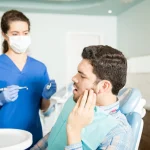Acne laser treatments have gained popularity as an effective solution for combating acne and improving skin texture. However, the impact of these treatments can vary depending on an individual’s skin type. In this article, we’ll explore how acne laser treatments or cara untuk hilangkan jerawat affect different skin types and what considerations should be taken into account.
Understanding Acne Laser Treatments
Before delving into the impact of acne laser treatments or cara menghilangkan jerawat batu on different skin types, it’s essential to understand how these treatments work. Acne laser treatments utilize focused laser beams to target and reduce the underlying causes of acne, such as bacteria, inflammation, and excess oil production. These treatments can range from ablative lasers that remove the top layer of skin to non-ablative lasers that stimulate collagen production and promote skin rejuvenation.
Impact on Different Skin Types
- Fair Skin:
- Individuals with fair skin generally respond well to acne laser treatments. They are less prone to pigmentation changes or scarring post-treatment, making it easier to achieve desired results. Non-ablative lasers, such as pulsed dye lasers or intense pulsed light (IPL) therapy, can effectively reduce acne lesions without causing significant damage to the skin’s surface.
- Medium Skin:
- People with medium skin tones may experience a moderate response to acne laser treatments. While they are still suitable candidates for most laser therapies, there is a slightly higher risk of post-inflammatory hyperpigmentation (PIH) or hypopigmentation. Dermatologists may adjust the laser settings or recommend additional precautions to minimize these risks and optimize treatment outcomes.
- Dark Skin:
- Individuals with dark skin tones are more susceptible to pigmentary changes following acne laser treatments. The risk of developing hyperpigmentation or hypopigmentation is higher, especially with ablative lasers or aggressive treatment settings. However, advancements in laser technology, such as fractional lasers or picosecond lasers, have made it possible to safely treat acne in darker skin types with minimal risk of adverse effects.
Considerations for Different Skin Types
When considering acne laser treatments for different skin types, several factors should be taken into account:
- Skin Sensitivity: Fair skin may be more sensitive to laser energy, requiring lower treatment intensities to avoid discomfort or adverse reactions. Conversely, darker skin tones may require longer wavelengths or specialized lasers to bypass melanin in the epidermis and target deeper layers of skin effectively.
- Risk of Side Effects: While acne laser treatments are generally safe for all skin types, there is a higher risk of side effects such as hyperpigmentation, hypopigmentation, or scarring in individuals with darker skin tones. Dermatologists must assess the patient’s skin type and tailor the treatment approach accordingly to minimize these risks.
- Treatment Settings: Adjusting the laser settings, such as wavelength, fluence, pulse duration, and spot size, can optimize treatment outcomes and reduce the likelihood of adverse effects in different skin types. Dermatologists with expertise in laser therapy can customize treatment protocols based on the patient’s skin characteristics and acne severity.
FAQs
- Can acne laser treatments worsen acne in certain skin types?
- Acne laser treatments are designed to reduce acne lesions and improve skin texture, but in some cases, they may initially trigger a temporary flare-up before improvement occurs. Dermatologists can adjust the treatment approach to minimize this risk and optimize results.
- Are there any specific post-treatment care recommendations for different skin types?
- Post-treatment care instructions may vary depending on the patient’s skin type and the type of laser treatment performed. Dermatologists typically recommend gentle skincare products, sun protection, and avoiding sun exposure to promote healing and prevent complications.
- How long do the results of acne laser treatments last in different skin types?
- The longevity of results from acne laser treatments varies depending on factors such as skin type, acne severity, and maintenance treatments. While some individuals may experience long-lasting improvements, others may require periodic touch-up sessions to sustain the results over time.
- Are there any alternative treatments for acne for individuals with sensitive skin?
- Alternative treatments for acne in individuals with sensitive skin include topical medications, oral antibiotics, chemical peels, and light therapy. Consulting with a dermatologist can help determine the most suitable treatment option based on the patient’s skin type and acne severity.
- What precautions should individuals with darker skin tones take before undergoing acne laser treatments?
- Individuals with darker skin tones should consult with a dermatologist experienced in treating skin of color and discuss the potential risks and benefits of acne laser treatments. Precautions may include performing a test spot to assess the skin’s response, using appropriate laser settings, and adhering to post-treatment care instructions to minimize the risk of adverse effects.




